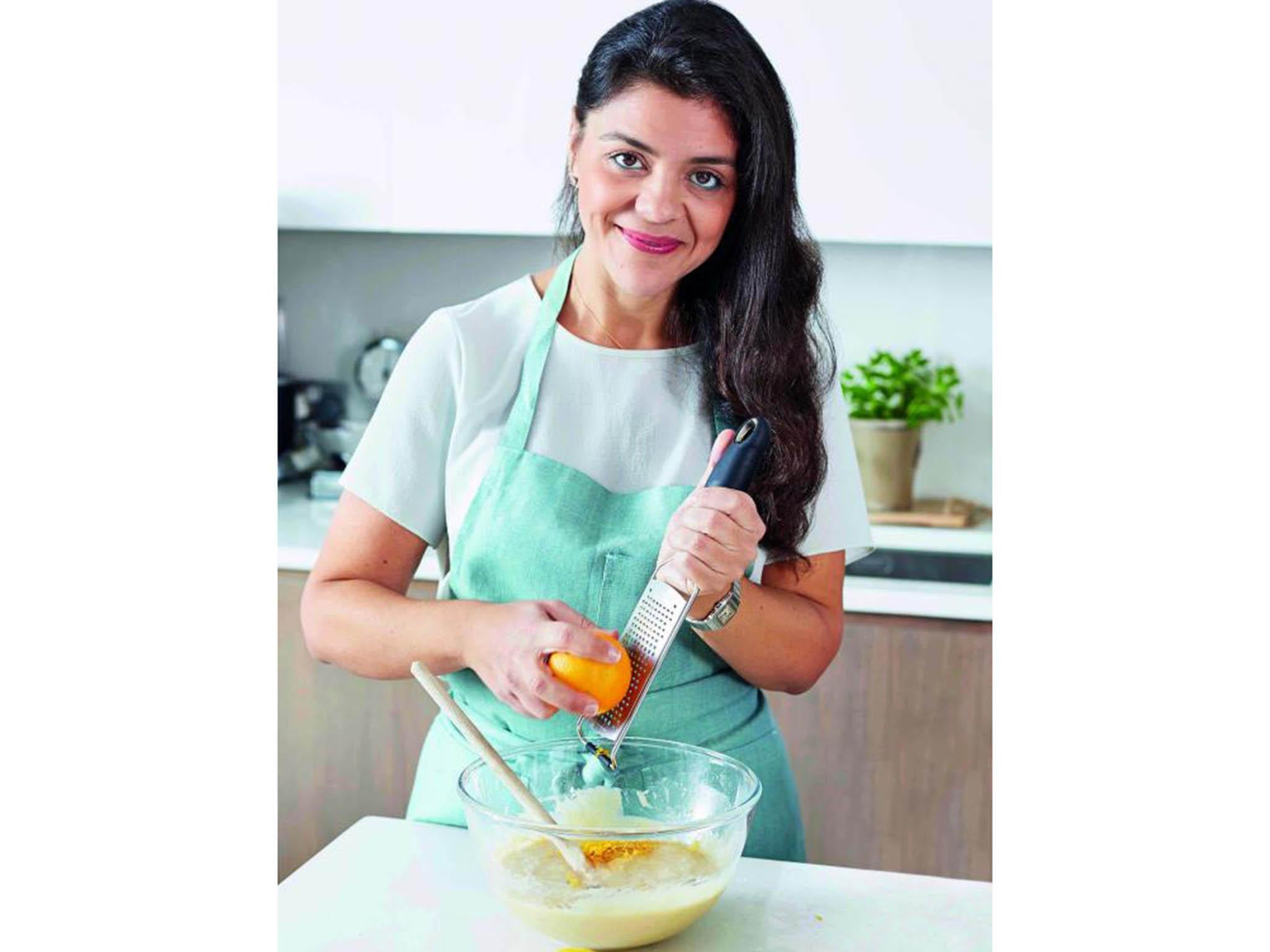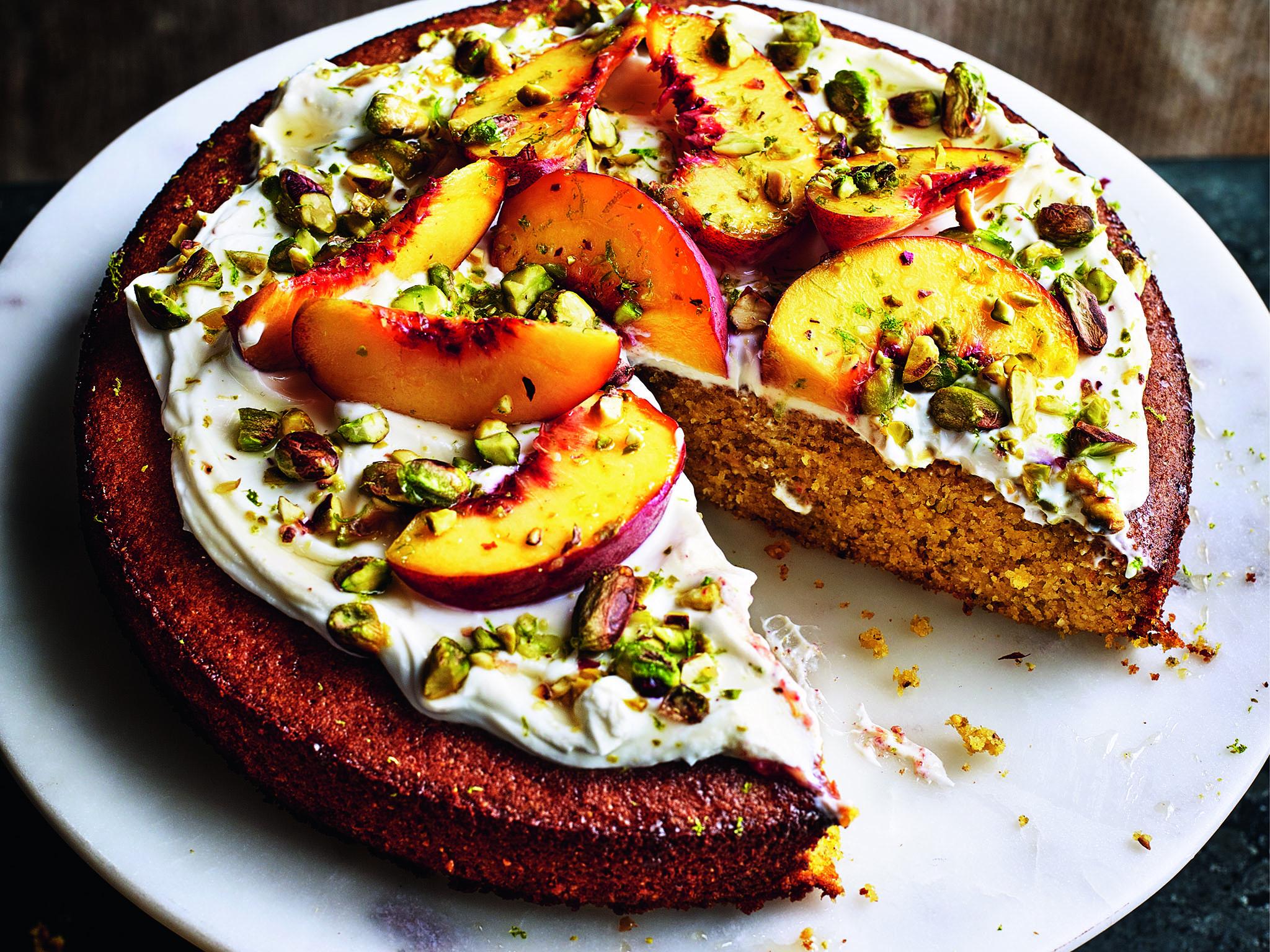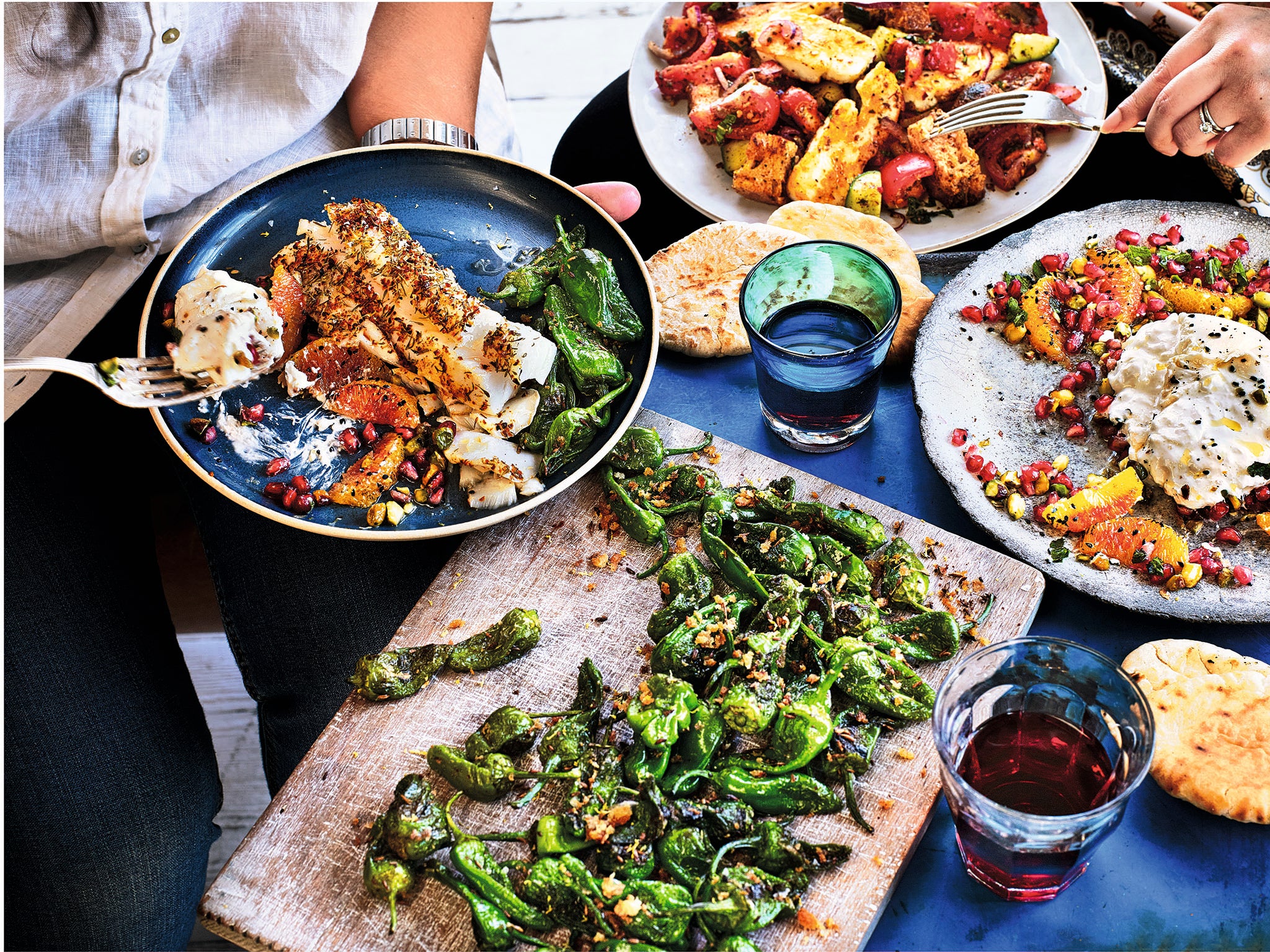Sabrina Ghayour on vegetarian cooking, being an only child and her secret ingredient
The Persian-English chef follows her award-winning cookbook, 'Persiana', with 'Bazaar', a meat-free book she never thought she'd write


You’ve just made to the move to Yorkshire. What made you move from London?
I do love London but was looking to buy my first house and just happened to be visiting Tommy Banks’ restaurant The Black Swan in Oldstead in North Yorkshire and just fell completely head over heels in love with the area and so started looking for houses there. It shocked so many friends and family but they all see why I love it so much, it is the complete opposite of London and while I still spend the bulk of my time working in London and abroad, that "coming home" feeling only really happens when I’m heading back to Yorkshire. The peace, tranquillity and warmth from friendly Yorkshire folk is unrivalled and makes it a joy to return home to.
Your fourth cookbook, Bazaar, is entirely vegetarian - where did the idea for a meat-free book come from?
It’s really funny but I am beginning to realise that my processes may be a little different to those of other cookbook authors, in that I don’t really have a "process", per se. I don’t really come up with ideas or concepts for books, ordinarily I keep lists of new recipes and ideas and when it comes time to write a book, I guess it is that list that becomes a book. I don’t like concept-led creation personally, it stresses me out to be creative with that kind of limitation when I actually thrive the most when there are no parameters.
Bazaar came around because I found myself eating more and more vegetables and less and less meat at home. As an Iranian, traditionally it is somewhat unusual to abandon meat for a main meal and hence unusual to come up with meatless Persian and Middle Eastern-inspired recipes. But the truth is, as I’m getting older, I’m craving meat, less and less and even more importantly, I do often struggle with digesting certain meats or large quantities of meat so I have been embracing vegetables in a way that we had never done before in my household and really trying to be creative and not just turn to choosing lots of dairy and white carbohydrates (both of which I love) as substitutes for meat in our diet.

While white carbs and dairy are utterly delicious, I personally don’t find that kind of meatless diet to be sustainable or especially moderately healthy so eventually that makes me switch back to meat.
Bazaar has made me cook clever, be creative and think hard about what might satisfy my palate for the long term and make me call something "food" rather than label it as "vegetarian", "meat-free" or "vegan".
I’m not a labels person, I just felt I was ready to write a book of "food for everyone" and that’s exactly what Bazaar is…. While I have written this mostly for people who still include meat in their diets but I feel, like me, need the most help with preparing meals that satisfy yet omit meat, these recipes accommodate vegetarians, vegans, coeliacs and even people of every religion who for whatever reason cannot eat certain food groups.
Food is a celebration and I think it’s especially wonderful when we can all sit at a table and everyone can enjoy the same feast together. Moreover, let’s be honest, for the person cooking the food (usually me), it’s a godsend to accommodate everyone’s requirements in one easy swoop.
Do you find yourself eating less meat?
Absolutely. No matter our culture or heritage, our bodies just aren’t designed to eat the volume of meat that we do.
Now, I hold my hands up and say that I have and occasionally still do eat more meat than my body feels happy indulging in but beyond survival, meat represents a time of plenty; a departure from war, famine and a lack of abundant produce and so rather quickly, we have made meat a part of daily life when even today, some cultures only embrace meat a few times only. Each to their own and I strongly believe in live and let live and that you cannot and should not preach to others about their choices, when you don’t understand or know anything about their circumstance.
Who taught you to cook?
Bizarrely none of my family cook, so I’m self-taught all the way. If anything I could say that, indirectly, Ken Hom and Madhur Jaffrey taught me how to cook while watching their shows on TV as a kid in the 1980s.
If anything not being taught to cook has given me the great freedom of expression, creativity and not being afraid to make mistakes. It has made me a far more confident cook than I’d realised and made me unafraid to cook for anyone and with any produce.
Cooking is my genuine passion and I’m currently sat in a kitchen in Venice while on holiday having cooked dinner for the past two nights using the most incredible local produce to create the dinner feasts. Just you try and keep me away from the kitchen anywhere in the world.
After nearly 40 years of idolising Ken Hom, I got to cook for him on Christmas Eve last year and it was magical (and a little nerve-wracking) for me to come full circle and to watch him enjoy and even take home my food!
What are your go-to ingredients?
A well-stocked store cupboard can be so endlessly giving. Maldon sea salt makes everything taste incredible, good black pepper, pul biber, chilli flakes, garlic granules, fresh garlic and Za’atar.
There lies the making of so many good meals whether bean, rice, pasta, meat, fish or vegetable-based. You can’t go wrong. Add lemon zest, a few other spices like cumin, cinnamon, coriander and turmeric and you are spoiling me. I also love Rose Harissa, I am very fussy about quality and only use Belazu Rose Harissa but I can literally do 500 things with it and never get tired or fail to be creative with its uses… it really is the gift that keeps on giving and the flavour and consistency is spot on and goes such a long way.

Although you left Iran aged just two, its heavily influenced your cooking. How have you ensured you retain your heritage in your food?
I only really perfected Persian food in my 20s. I was a rotten, party-animal teenager and didn’t spend much time in the kitchen.
In 2011 I started cooking Persian and Middle Eastern food at Supperclubs and catered for private clients and noticed increasing amounts of people wanted to attend my suppers, and also as word of mouth spread, I was inundated with requests for weddings and private events.
It occurred to me that nobody was doing Persian food in the UK from a media perspective and while I didn’t go about trying to publicise it, it happened very naturally just through posting pictures on social media and doing the odd mailer here and there but teaching cookery classes has always been one of my most important elements of work after supper clubs ended.
I’ve met and fed thousands of people in the past eight years and learned so much about what they love about the food and sometimes their personal connection to Persian cuisine and culture. I’ve been lucky to hear their stories, experiences, see Iran through their eyes and own travel experiences and really learn from them and also help understand why people love the food so much.
Persian food is often labelled as "elegant" and while that is generous and wonderful, its elegance lies in its simplicity, technique and gentle aromatic fragrance from the key flavour profiles of citrus, herbs and ingredients like saffron and rose. Persians don’t like spicy food, don’t really use more than a handful of cumin and little subtle turmeric here and there, they don’t like chilli, don’t really use garlic (unless you are from the region that grows garlic), they don’t eat much fish (unless you live by the sea) and aren’t a very dairy heavy culture as we basically have one cheese – paneer – and that’s it. We revere well-marinated, tender charcoal-grilled lamb, juicy saffron and lemon marinated poussin, tender lamb cooked in a myriad of stews and more than anything else, our famous, fragrant and perfectly cooked rice with that infamous crispy ‘tahdig’ crust.
How did you end up becoming a chef?
I have been cooking since I was 5 or 6 and took over the cooking in the house by the age of 11 but I became a Chef in 2011 as a result of being made redundant from my job in marketing. Redundancy is often the best thing that has happened to me (yes, 3 times so far) and every single time, it has made me think hard, work hard and bounce back quickly with a need to survive and earn money to make ends meet. It has never been easy and I have never had anything handed to me and I have had to work hard my whole life but I was lucky to choose something that nobody was doing back in 2011 and lucky for me, it has paved the way for much diversity and many interesting experiences in my career. Working for yourself is hard and sometimes sends me over the edge, but I wouldn’t change it for the world.
You ran a supper club and now teach cooking courses, what’s the biggest thing you find people don’t know about Middle Eastern food?
That there really is no ‘Middle Eastern’ food. The region is so diverse and truthfully most Persians refuse to be classed as Middle Eastern because we see ourselves as a thriving ancient culture that pre-dates that label. Iran to Lebanon, Arab States to Turkey, the food is so incredibly different…. We don’t always even like some of each others food because we eat in such different ways. The one thing I would say is that the Middle Eastern food we know today is heavily influenced by many different cultures across the region, Ottomans occupied so many lands and so their food and traditions are embedded in many cultures too. But the most common misconception is that all food from the region is "spicy", in fact Persians use very little spice and neither do Iraq, Lebanon, Turkey and many other countries. Some may have a spice blend like "Baharat" but that’s about it. Lemon, herbs, tomato and sometimes pomegranate molasses account for base flavours of many dishes across the region.
How would you describe your cooking?
Carefree, unfussy, flexible, rough-n-ready but full-flavoured despite being ludicrously simple.
Your first cookbook, Persiana published in 2014, won awards and accolades – did you ever think it would be so popular?
No way! Once the book was ready, I stopped and though “Oh no, who on earth is even going to buy this book? What have I done? How did I think this was a good idea?”
Thank god it has done well because I’d hate to pour my heart in soul into any project and see it fail. I’m a Capricorn, failure is not an option, therefore I choose my work very carefully and only take very well-calculated risks – but with books, how on earth can you predict success? All I know is work hard, be unique, keep your head down and don’t be influenced or made to feel insecure by what other people do. It took me many years to learn that lesson, but it has been one of the best ones I’ve learned and I still have to remind myself of it every now and again. You never get anything by chasing it, I’ve tried, if something is meant to come to you, it will, as long as you just keep your head down and get on with life.
Considering its success, was your second book, Sirocco, hard to follow up with?
Of course, it was my first taste of second-album-syndrome style anxiety. Writing the book and recipes were easy but my anxiety was riding high waiting to see what people thought about the book and its direction.
I still love that book and absolutely know it was the best choice for a second book rather that writing Persiana 2.0! It did defy expectation but hey, if you want to know what I eat at home, how I cook and which ingredients I use to make my life simple when it comes to creating meals, then you can’t go far wrong with Sirocco!
I still get people who love my books but don’t know about Sirocco and I just think how great is that to be known for your work but still have more for people to discover? My books aren’t going anywhere, people can and should take their time to discover them, if they so choose
New cookbooks hit the shelves weekly, how do you make yourself stand out from the rest?
I don’t pay any attention to what comes and goes in the market. I’ve always been a stubborn only child and to be honest, it is finally paying dividends as I think it can be dangerous to jump on trends and do things because "there is a market for it".
I turned down the idea of writing a vegetarian book several times because it didn’t reflect the meal choices I was making at home, so what was the point? I am a tough cookie when it comes to being told what to do… generally, I don’t like it and if someone pushes me to go in one direction, if they push hard enough, I will turn right round and go the other way.

The truth is, I have a brilliant publisher who have never pushed me hard in any direction. By and large I have been given free-reign creatively and sometimes they run ideas by me and if the shoes fits, then great but never an actual idea/direction for my next book.
I trust them 100 per cent and they know the publishing world and the market inside out, so I’d be a fool not to listen to their wisdoms but they also know that we have a very similar vision and from day one, I decided I wanted to write the everyday, easy, accessible Persian/Middle Eastern style book because all the beautiful, ethereal Eastern books have already been written and I own and love them all.
I grew up here, have shopped in supermarkets here, know what they sell and what they don’t, know what’s harder to find and what you can leave out… I didn’t want to write beautiful but ingredient heavy recipes to stress people out, instead I wanted to deliver bags of flavour in a totally laid-back way, which is genuinely how I cook myself.
Happy days really as I’m only sharing content that comes naturally to me and while many of my recipes aren’t authentically Persian or Middle Eastern these days, people know that they can rely on me for three factors: Simple, economical and full-flavoured recipes. I’m not sure how to label that but four books in and I have felt a shift from my readers and now feel that I have earned a level of trust from them which perhaps I was still striving to earn in previous years.
What’s your favourite recipe from the new book?
Gosh, I wouldn’t know how to choose because how I eat is really led by my mood… so there are quite a few but the two that I have made the most in the past few years are the Spiced green bean and tomato rice (Persian "Loobia Polow") – a classic Persian dish and also the Aubergines with tamarind and tomato. These two dishes have helped me win over hordes of people to my style of meatless cooking. When you can win over people from an Eastern culture, whether Persian, Greeks, Turks or Arabs with a meatless meal, you know you’re onto something good.

Who in the food world do you look to for inspiration?
I don’t look to others, instead I travel the world as much as I can and learn from other cultures about their traditions, techniques and ingredient used and then I come back with these memories and influences and create simple dishes that taste and feel good to me and my family and friends.
What's next in 2019?
This has by far been the busiest year of my life work-wise and I can’t say that I am going to slow down but I have booked a few little breaks here and there to explore, eat and experience other lands, culture, food and history.
I’m currently in Venice and I am captivated by its history of trade with the East, everything from saffron and exotic spices to textiles, pearls and other expensive highly-prized symbols of status from the Eastern world. Autumn is a busy work period, lots more cookery classes and I work a lot with private clients on brand and product development as well as work with Chefs up and down the country to teach them about the ways, both traditional and modern, in which spices and Persian and Middle Eastern ingredients and techniques can be used in their own style of cookery.
Subscribe to Independent Premium to bookmark this article
Want to bookmark your favourite articles and stories to read or reference later? Start your Independent Premium subscription today.


Join our commenting forum
Join thought-provoking conversations, follow other Independent readers and see their replies
Comments